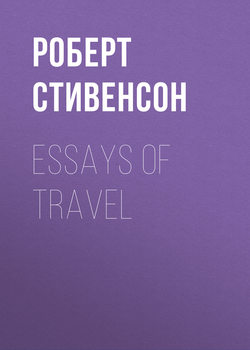Essays of Travel

Реклама. ООО «ЛитРес», ИНН: 7719571260.
Оглавление
Роберт Стивенсон. Essays of Travel
I. THE AMATEUR EMIGRANT
THE SECOND CABIN
EARLY IMPRESSIONS
STEERAGE SCENES
STEERAGE TYPES
THE SICK MAN
THE STOWAWAYS
PERSONAL EXPERIENCE AND REVIEW
NEW YORK
II. COCKERMOUTH AND KESWICK. A FRAGMENT. 1871
COCKERMOUTH
AN EVANGELIST
ANOTHER
LAST OF SMETHURST
III. AN AUTUMN EFFECT. 1875
IV. A WINTER’S WALK IN CARRICK AND GALLOWAY. A FRAGMENT. 1876
V. FOREST NOTES 1875–6
ON THE PLAIN
IN THE SEASON
IDLE HOURS
A PLEASURE-PARTY
THE WOODS IN SPRING
MORALITY
VI. A MOUNTAIN TOWN IN FRANCE 5. A FRAGMENT. 1879
VII. RANDOM MEMORIES: ROSA QUO LOCORUM
VIII. THE IDEAL HOUSE
IX. DAVOS IN WINTER
X. HEALTH AND MOUNTAINS
XI. ALPINE DIVERSIONS
XII. THE STIMULATION OF THE ALPS
XIII. ROADS. 1873
XIV. ON THE ENJOYMENT OF UNPLEASANT PLACES. 1874
Отрывок из книги
Our friendship was not only founded before we were born by a community of blood, but is in itself near as old as my life. It began with our early ages, and, like a history, has been continued to the present time. Although we may not be old in the world, we are old to each other, having so long been intimates. We are now widely separated, a great sea and continent intervening; but memory, like care, mounts into iron ships and rides post behind the horseman. Neither time nor space nor enmity can conquer old affection; and as I dedicate these sketches, it is not to you only, but to all in the old country, that I send the greeting of my heart.
I was not, in truth, a steerage passenger. Although anxious to see the worst of emigrant life, I had some work to finish on the voyage, and was advised to go by the second cabin, where at least I should have a table at command. The advice was excellent; but to understand the choice, and what I gained, some outline of the internal disposition of the ship will first be necessary. In her very nose is Steerage No. 1, down two pair of stairs. A little abaft, another companion, labelled Steerage No. 2 and 3, gives admission to three galleries, two running forward towards Steerage No. 1, and the third aft towards the engines. The starboard forward gallery is the second cabin. Away abaft the engines and below the officers’ cabins, to complete our survey of the vessel, there is yet a third nest of steerages, labelled 4 and 5. The second cabin, to return, is thus a modified oasis in the very heart of the steerages. Through the thin partition you can hear the steerage passengers being sick, the rattle of tin dishes as they sit at meals, the varied accents in which they converse, the crying of their children terrified by this new experience, or the clean flat smack of the parental hand in chastisement.
.....
With all these capabilities, here was Mackay, already no longer young, on his way to a new country, with no prospects, no money, and but little hope. He was almost tedious in the cynical disclosures of his despair. ‘The ship may go down for me,’ he would say, ‘now or to-morrow. I have nothing to lose and nothing to hope.’ And again: ‘I am sick of the whole damned performance.’ He was, like the kind little man, already quoted, another so-called victim of the bottle. But Mackay was miles from publishing his weakness to the world; laid the blame of his failure on corrupt masters and a corrupt State policy; and after he had been one night overtaken and had played the buffoon in his cups, sternly, though not without tact, suppressed all reference to his escapade. It was a treat to see him manage this: the various jesters withered under his gaze, and you were forced to recognise in him a certain steely force, and a gift of command which might have ruled a senate.
In truth it was not whisky that had ruined him; he was ruined long before for all good human purposes but conversation. His eyes were sealed by a cheap, school-book materialism. He could see nothing in the world but money and steam-engines. He did not know what you meant by the word happiness. He had forgotten the simple emotions of childhood, and perhaps never encountered the delights of youth. He believed in production, that useful figment of economy, as if it had been real like laughter; and production, without prejudice to liquor, was his god and guide. One day he took me to task – novel cry to me – upon the over-payment of literature. Literary men, he said, were more highly paid than artisans; yet the artisan made threshing-machines and butter-churns, and the man of letters, except in the way of a few useful handbooks, made nothing worth the while. He produced a mere fancy article. Mackay’s notion of a book was Hoppus’s Measurer. Now in my time I have possessed and even studied that work; but if I were to be left to-morrow on Juan Fernandez, Hoppus’s is not the book that I should choose for my companion volume.
.....